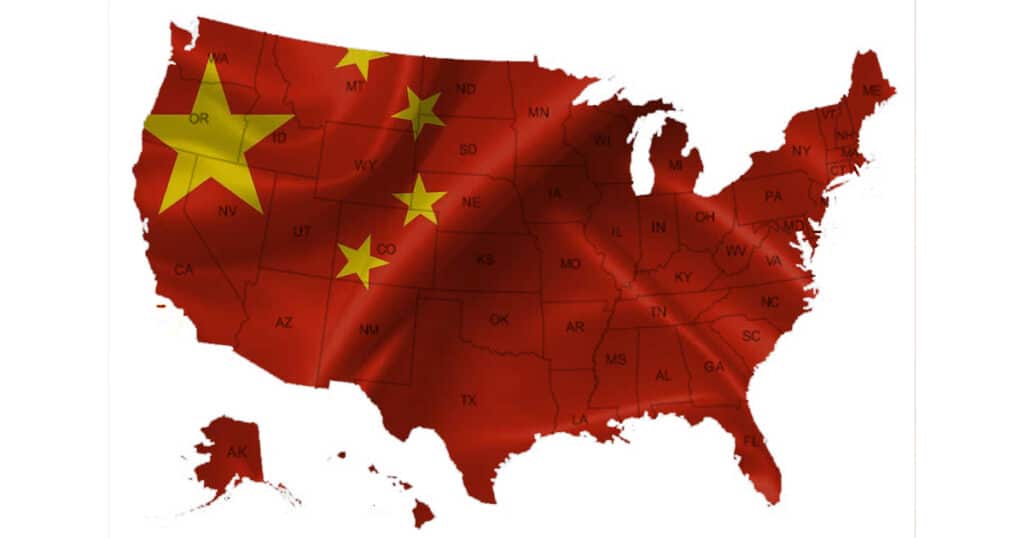
Unprecedented Surge in Chinese Illegal Immigration Raises Security Concerns
I served as a Foreign Service officer in seven countries. I have adjudicated thousands of visa applications to facilitate lawful visits, commerce, and immigration to the United States while excluding aliens who were legally inadmissible. The visa process I worked with overseas stands in total contrast to what happens at the U.S. border today.
Over the past two years, I have visited the border in Arizona, California, New York, and Texas. On those visits, I saw nationals of many countries apprehended by the Border Patrol. In San Diego last March, I watched Border Patrol dropping off dozens of aliens, including Chinese, at a bus stop to release them into the country.
Mass release of people who entered the country illegally happens nearly every day, multiple times, at multiple locations. At best, this is a mockery of U.S. immigration law and sovereignty. At worst, it is a huge national security and community safety risk. In addition to many Chinese aliens with connections to the Chinese Communist Party, People’s Liberation Army, and other state entities, it is statistically probable that the Department of Homeland Security is releasing people with serious criminal records.
According to U.S. law, DHS is supposed to detain aliens who enter the country illegally. But the Biden administration has replaced border control with mass processing, parole, and release. DHS has also abused immigration parole at an unprecedented scale.
In January 2021, which included the first 11 days of the new Biden administration, the Border Patrol encountered 17 Chinese aliens between ports of entry. By January 2024, it was 3,700 in that one month alone. As of April 30 this year, DHS had already encountered 48,501 inadmissible Chinese aliens in fiscal year 2024 (which began Oct. 1, 2023); 27,583 of them between ports of entry.
Nearly all are being released into an asylum process that will take years to conclude. At the end of that process, those ordered removed are extremely unlikely to be deported, because the Chinese government does not cooperate in accepting their nationals back.
In fiscal year 2023, Immigration and Customs Enforcement removed only 288 Chinese aliens, leaving up to 100,000 still in the U.S., despite final orders of removal.
Most Chinese entering illegally are seeking employment. They use asylum claims to enter, remain, and work in the United States. Illegal immigration ebbs and flows corresponding to a risk-reward calculation. Today, Chinese are coming in great numbers simply because they can. Worldwide awareness of our open border, spread by social media, shows them how.
For example, Chinese citizens do not need a visa to fly to Ecuador, after which they can continue by land north to the U.S. And starting on May 17, Air China will begin direct flights from Beijing to Havana. If Chinese aliens are willing to take the dangerous trek by land from Ecuador to the U.S. via the Darien Gap, why wouldn’t they also be willing to traverse the 90 miles by water to Florida?
Overseas, an in-person interview by a U.S. consular officer is the first line of “vetting” for foreign visa applicants wanting to come to the United States. This is buttressed by consular staff who know local languages, customs, and news. Larger embassies host other federal agencies that can assist with vetting investigations.
The second line of vetting is through automatic checks of U.S. government databases. Applicants are frequently refused entry based on adverse information that would not have been discovered had the person arrived illegally with no identity documents at the border.
Meanwhile, at the border today, most “national security decisions” of who gets into our country are no longer made by American officers. Under President Joe Biden’s policies, what was once a privilege for aliens has become a right.
Despite what the Biden administration wishes the public to believe, there is no real “vetting” of those released at the border, nor of those allowed in under parole programs, much less of the “gotaways” who enter covertly between ports of entry without inspection. The official visa “front door” competes with a wide-open back door at the border, where there are no routine criminal background checks using records from the person’s home country. Unless a foreign national has a record held by U.S. agencies, DHS is flying blind.
Concerning China specifically, Customs and Border Protection agents have reportedly reduced the number of standard questions asked of inadmissible Chinese aliens at the border from 40 to five.
But, however many questions, the process relies on an alien telling the truth and agents taking them at their word. Even if Customs and Border Protection requests additional information on an individual, China routinely ignores U.S. requests for verification of nationality, and they reportedly hide records of criminal and corruption cases.
DHS releases most aliens caught at the border with a Notice to Appear in immigration court—at a date far into the future. Aliens are then free to go wherever they want, with no way for ICE to easily find them.
There are more than 6 million aliens on ICE’s Non-Detained Docket, of whom only about 184,000 are tracked using what’s called Alternatives to Detention, which uses passive methods to track them, such as having the alien check in with ICE by phone every day. Only 2% of aliens tracked using Alternatives to Detention have actual GPS monitors.
To close this dangerous loophole, the U.S. needs to re-implement agreements with Mexico and Northern Triangle countries of Central America so that inadmissible aliens are not released into the interior of the U.S. pending the decision in their asylum cases, but instead remain in those countries as they await their determinations (the vast majority of which will result in their asylum applications being rejected).
Given the population, economy, and politics of China, the U.S. can never meet the demand for those seeking to enter our country illegally. The U.S. will at some point have to remove those who are ineligible to enter or remain, or else abandon the rule of law that made this country so attractive for so many immigrants in the first place.



